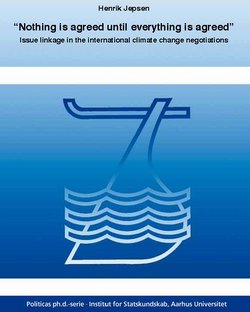Henrik Jepsen
"Nothing is agreed until everything is agreed". Issue linkage in the international climate change negotiations

In the international climate change negotiations, parties bargain not only over greenhouse gas emissions but also over adaptation, financing, technology transfer and much more. As such, the negotiations represent instances of issue linkage – simultaneous negotiation of multiple issues for joint settlement.
Optimists claim that issue linkage increases efficiency because it allows for package deals. Pessimists, on the other hand, claim that issue linkage decreases efficiency because it motivates parties to withhold information, cycle issues, and take negotiations hostage. Despite much interest in the climate change negotiations, no existing study has tested these claims systematically.
This dissertation clarifies how linkage works, when linkage works, and what the effects of linkage are. Using process tracing techniques and qualitative comparative analysis (QCA), it examines 25 linkages in the three negotiation rounds that produced the Framework Convention, the Kyoto Protocol and the Copenhagen Accord. The conclusion is that issue linkage allows parties, chairpersons, and decision‐makers to craft package deals – but only when the conditions that bring about potential gains from issue linkage, leadership, and legitimacy are present, and so far not without incurrence of unnecessary transaction costs.
Udgivet januar 2013.
Kan ikke downloades.
![]() Ophavsretten tilhører Politica. Materialet må ikke bruges eller distribueres i kommercielt øjemed.
Ophavsretten tilhører Politica. Materialet må ikke bruges eller distribueres i kommercielt øjemed.